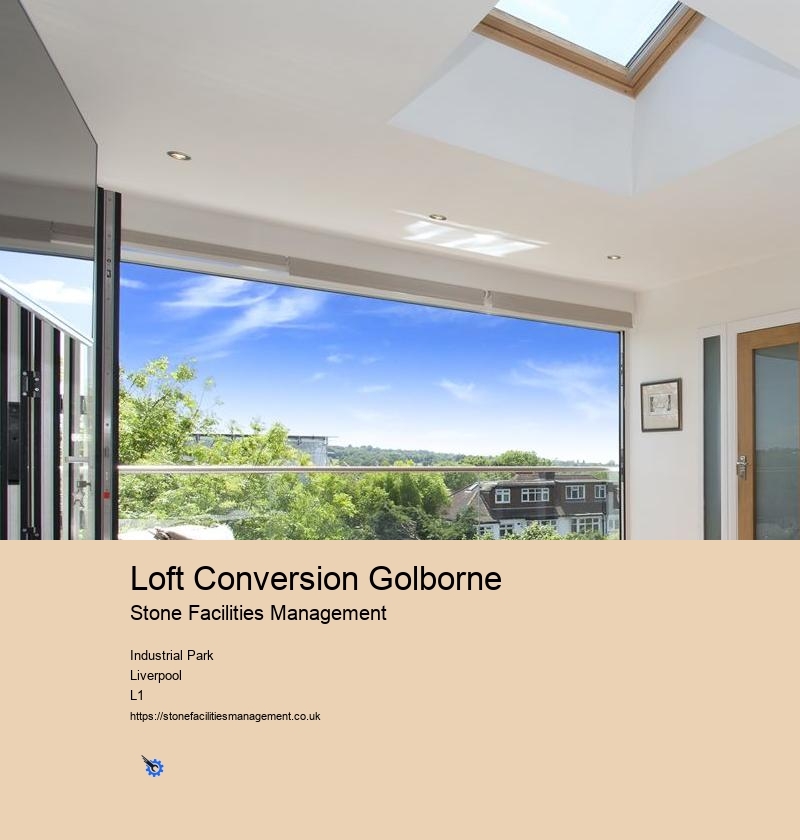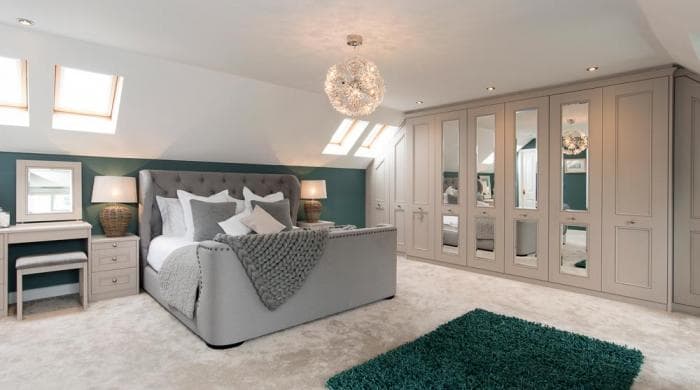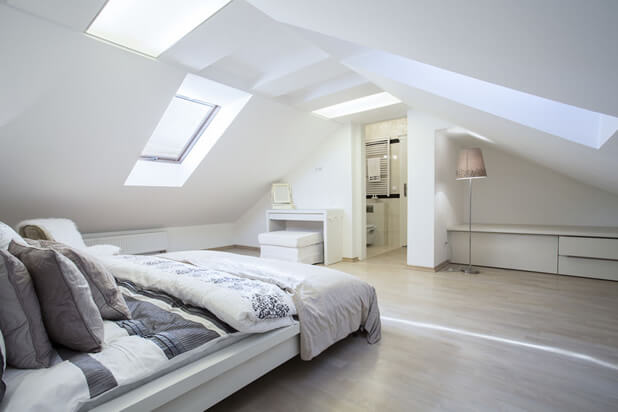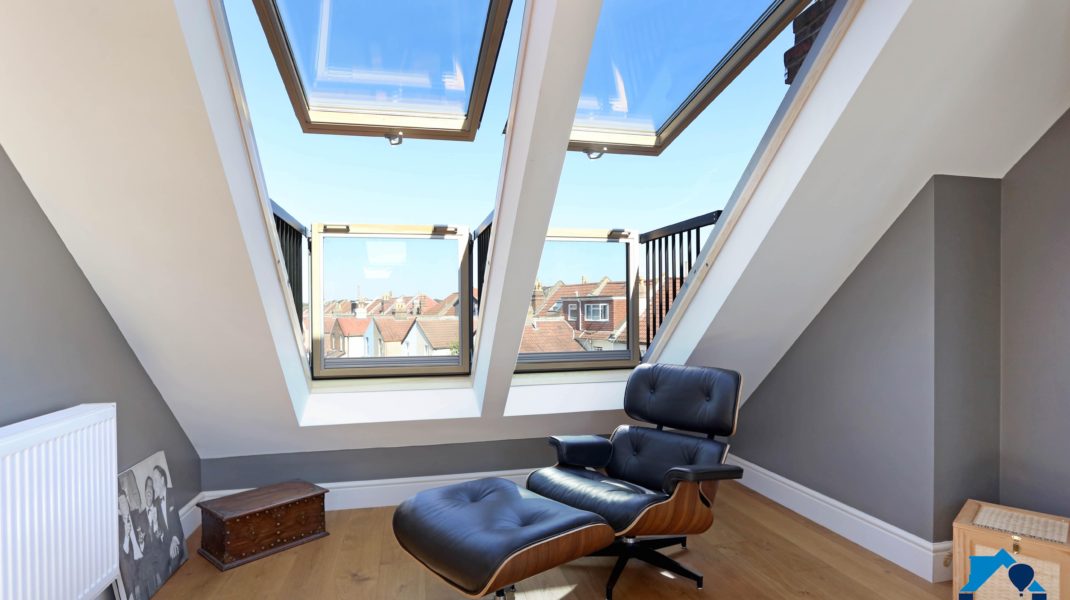Loft Conversion Golborne
Loft Conversion Liverpool
Finally, it’s important to think about the type of furniture and fixtures you’ll be installing in the loft. If you’re planning to install a large wardrobe or a full-size bed, for example, you’ll need to factor in the space required for these items when calculating the amount of space you’ll lose.
If you’re considering converting your loft in Liverpool, there are several factors to consider before taking the plunge. The first and most important step is to check if your loft can be converted in the first place. There are a few key points to bear in mind when assessing your loft’s suitability for conversion.
In terms of cost, the cost of a loft conversion in Liverpool can vary greatly depending on the size of the project and the type of work required. Generally speaking, you should budget for at least £20,000 for a basic conversion. This figure will be higher if you require more extensive work to be carried out.
The first step is to decide what type of loft conversion you want. There are two main types: a dormer loft conversion and a hip-to-gable loft conversion. The type of conversion you choose will largely determine the cost. Dormer conversions often require more structural work and are more expensive than hip-to-gable conversions.
If you do have a suitable loft, the next step is to consider how much it will cost to have it converted. This will depend on the size of the loft, the level of work required and the materials you choose. In Liverpool, the average cost of having a loft converted is around £20,000 - £25,000. This cost could be higher or lower depending on the specifics of the project.
Once the loft conversion is complete you will have a brand new bedroom and you will have increased the value of your home. You can use the extra space however you choose – it could be a bedroom, study, playroom, or anything else you can think of.

Loft Conversion Liverpool
The size of the loft is an important factor when it comes to assessing its conversion potential. In order to be suitable for conversion, the loft space must be large enough to fit a bedroom, bathroom, storage area, and other necessary features. If the space is too small, then it’s likely not suitable for conversion.
When it comes to the type of loft conversion that is best for your home in Liverpool, a dormer conversion is often a great option. Dormer conversions can provide extra space and light, as well as improving the overall aesthetic of the home. Dormer conversions can also increase the value of your home, which can be a great benefit if you’re looking to sell in the future.
The next step is the construction work, which usually takes around 4 to 6 weeks to complete. During this stage, workers will install partitions, ceilings, stairs, and other elements to create the extra living space. This process also involves wiring, plumbing, and installing insulation.
Finally, it’s important to consider access to utilities. If the loft is too far away from plumbing and electricity, then it may not be suitable for conversion. It’s also important to factor in any necessary staircases or ladders, as these may increase the cost and complexity of the project.
In terms of cost, loft conversions are typically cheaper than an extension. This is because the conversion works with the existing structure of the house, so there is no need to build additional walls or foundations. Additionally, converting your loft requires less labour and materials than an extension.
When it comes to deciding on the best type of loft conversion for your home in Liverpool, it’s important to consider all the costs associated with the project. Converting a loft to a dormer can be a great way to add extra space and light to any home, but it can also come with a hefty price tag. So, how much does it cost to convert a loft to a dormer in Liverpool?
Next, you'll need to consider the materials you'll be using. If you opt for high-quality materials like cedar shingles or slate tiles, the cost will be higher than if you use less expensive materials like asphalt shingles. Other factors you'll need to consider include the size of the dormer, whether you hire a professional to do the work, and the cost of any additional building permits or inspections that may be necessary.
When it comes to creating an extra bedroom in your home, a loft conversion is one of the most popular options. It is a great way to add value to your property as well as providing you with much-needed extra space. If you live in Liverpool, you may be wondering how much it would cost to have your loft converted into a bedroom.
You should also consider the cost of legal fees, planning permission and building regulations. Make sure you factor these into your final budget.
Relevance
| Loft conversion | Attic |
| Roof | Rafters |
| Dormer | Lofts |
| Floor | Gable |
| Planning Permission | Mansard |
| Windows | Door |
| Insulation | Velux |
| Staircase | Eaves |
| Bedroom | Building Regulations |
| Bathroom | Plumbing |
| Joists | Ventilation |
| Stair | Architect |
| Ceiling | DIY |
| Hipped-roof | Building Control |
| Stud Wall | Staircases |
| Roofing | Hips |
| Joists | Stairway |
| Natural Light | Frame Structure |
Wikipedia says this about Liverpool
Loft Conversion Dormer Liverpool
Loft Conversion Cost
Making the most of the space in your home is a great way to add value and comfort to your property, and a loft conversion can be a great way to do this. But for many homeowners, the cost of a loft conversion is a major concern. Fortunately, there are some ways to save money when converting a loft. Here, we’re taking a look at the cheapest way to do a loft conversion in Liverpool.
Finally, if you’re not looking to make any major structural changes to your house, you may want to consider a Velux loft conversion. This type of conversion involves adding Velux windows to the roof of your house to create extra living space. Velux conversions are cost-effective and can provide plenty of extra living space without requiring any major structural changes.
Overall, converting a loft to a dormer can be a great way to add extra space and light to any home in Liverpool. However, it’s important to consider all the associated costs before embarking on the project. On average, a dormer conversion in Liverpool can cost anywhere between £10,000 and £30,000, but this cost can be higher depending on the size and complexity of the project.
If you’re looking to add extra living space to your home by converting your loft into a dormer, you may be wondering how much it will cost. The cost of converting a loft to a dormer in Liverpool can vary depending on a range of factors, such as the size of the loft, the type of conversion and the contractor you choose.
When considering the costs associated with a loft conversion to a dormer, it’s important to factor in the cost of any additional materials or labour required. This includes the cost of new windows, doors, flooring, and other fixtures. Additionally, you may also need to factor in any additional professional services, such as architectural design or engineering, which can drive up the cost of the project.
However, a dormer conversion has a number of advantages over a Velux loft conversion. Dormer conversions offer more space and headroom, as the dormer extension creates a fully usable room within the loft. Dormer conversions also offer more design flexibility, as the dormer can be built in a variety of styles to match the existing architecture of the house. Additionally, dormer conversions may be more suitable for properties with limited natural light, as the windows in the dormer extension can be positioned to provide additional illumination.
If you’re looking to have a more luxurious loft conversion, then the cost can be much higher. This could include features such as an en-suite bathroom, velux windows, or even a staircase. The cost of a high-end loft conversion in Liverpool can range from £25,000 to £50,000.
The third option is a straight staircase, which is the most common type of staircase used in loft conversions. This type of staircase is more expensive than the other two options, but it provides the most space and is the most aesthetically pleasing. A straight staircase can be customized to fit your needs and can also provide more space for storage underneath the stairs.
If you’re wondering how to check if a loft can be converted, it’s important to know the different ways to determine if your particular loft is suitable for conversion. The first step is to assess the size and shape of the space, as well as its current structural integrity. You’ll also need to consider the local regulations and building codes, as well as the access to utilities like plumbing and electricity.
Finally, you could also opt to build the stairs outside of the house. This can be a great option for larger loft conversions, as it allows for more space in the existing house. However, it also requires more construction work and may not be suitable for all types of loft conversions.

Loft Conversion Dormer
Overall, converting your loft into a bedroom can be a great way to make the most of the space in your home. However, it is important to consider the costs and the work involved before taking on the project.
If you’re looking to maximize the living space in your Liverpool home, a mansard loft conversion may be the best option. This type of conversion involves extending the roof of your house to create a new, larger roof with a shallow pitch. Mansard loft conversions can provide a significant amount of extra living space, but they are also more expensive and require more structural work than other types of conversions.
Are you looking to add extra living space to your Liverpool home? Loft conversions are an increasingly popular way to do just that. But deciding which type of loft conversion is best for you can be a challenge. In this article, we’ll take a look at the different types of loft conversions available in Liverpool, their benefits, and which might be best for you.
In conclusion, there are a few ways to save money when converting a loft in Liverpool. Consider the type of conversion you want, get quotes from local builders and compare prices, and explore DIY options if you’re confident that you can do the work yourself. With careful planning and a realistic budget, you can
When considering the most expensive part of a loft conversion in Liverpool, it is important to factor in all of the costs associated with the project. From the roof to the labour costs, the total cost of a loft conversion can quickly add up. However, the result of a successful loft conversion can be well worth the expense.
Alternatively, if you live in a semi-detached or detached house, a hip-to-gable loft conversion may be the best option. This type of conversion involves extending the existing roofline and creating a larger roof space. This type of loft conversion is more expensive, but can add more value to your property, as it creates more usable space.
When considering the cost of a loft conversion in Liverpool, it's important to factor in the cost of getting the necessary building permits. You'll need to get permission from your local council before you can start any work, and this can add a few hundred pounds to your total bill.
Loft conversions allow you to increase the living space in your home without the need to move to a larger property. This can save you a significant amount of money on moving costs, as well as the costs of stamp duty and legal fees.
In addition to increasing the value of your home, loft conversions can also help to improve your home’s energy efficiency. By improving the insulation in your loft, you can reduce your energy bills and make your home more comfortable. This can be a great way to save money in the long run, as well as increasing the value of your home.
Loft Conversion Stairs
First, it’s important to consider the cost of having your loft converted in Liverpool. Depending on the size and complexity of your project, the cost can range between £20,000 and £40,000. Of course, the more intricate the design, the more expensive the project will be. However, for the money you invest, you’ll also be able to enjoy a range of benefits.
When it comes to loft conversions in Liverpool, the most expensive part is typically the cost of the structural work. This includes the cost of the roof, roofing materials, and any additional structural supports that may be needed. Additionally, the cost of any additional labour required to complete the project can also be quite high. Depending on the size and complexity of the loft conversion, the cost of the structural work could range from several thousand pounds to tens of thousands of pounds.
In addition to planning permission, you may also be required to obtain a building regulation approval. This is essentially a set of standards that the structure must meet in order to be deemed safe and secure. The building regulation approval is typically issued by an independent expert, such as an architect or surveyor, who will inspect the work to ensure that it meets the necessary standards. The cost of obtaining a building regulation approval will depend on the size and scope of the project, so it is important to factor this into your budget.
For example, if your property is an apartment or a flat, you will need to obtain permission from the building’s freeholder. If the loft conversion will affect the outside of the building, then you may need to apply for planning permission.
Have you ever thought about converting your loft? A loft conversion can be a great way to add extra living space to your home, and it’s often much more affordable than moving house. But how much does it cost to have a loft converted in Liverpool?
Local regulations and building codes must also be taken into account when assessing the conversion potential of a loft. You’ll need to check with your local council to find out what the regulations are in your area, and what would be required to meet them.
If you are looking for the cheapest way to do a loft conversion in Liverpool, there are a few things you should consider. The first is the size of the loft, as this will determine the amount of materials and labour needed to complete the project. Additionally, the complexity of the project, such as any structural work needed, will also contribute to the overall cost.
Finally, you’ll need to make sure you have the correct planning permission. If the loft conversion is within permitted development rights, you won’t need to apply for planning permission. However, if your proposed works are outside of these, you’ll need to apply for planning permission from Liverpool City Council.
If you’re considering converting your loft in Liverpool, you’ll be pleased to know there are several types of loft conversions that can be done in the city. Depending on the structure of your house, the size and height of your loft, and your budget, you can choose from a variety of options to make the most of the space.
Loft Conversion Golborne

Loft Conversion Ideas
When considering whether to convert your loft, it’s important to weigh up the costs and benefits. A loft conversion can add considerable value to your home, and also provide much-needed extra living space. However, it’s important to make sure that the cost of the project is worth it in the long run – if the cost of the conversion is more than the value it adds to your home, then it’s probably not worth doing.
One advantage of a Velux loft conversion is that it is generally less disruptive to carry out, as it does not require any changes to the structure of the roof. Velux loft conversions are also generally quicker to complete and may be more suitable for properties with restricted access or awkward roof shapes.
The cost of an extension also depends on the type of extension you want. Single-storey extensions are usually the most cost-effective, while two-storey extensions can be more expensive. You may also want to consider adding features such as a conservatory or a garden room to your extension, which can add to the cost.
A dormer loft conversion involves building an extension out of the roof, which creates extra living space without losing any space inside the home. This is because the additional space is created from the roof, which is usually unused anyway. This type of loft conversion is also very cost-effective, making it a great option for homeowners in Liverpool who are looking to add extra space without breaking the bank.
The materials needed for a loft conversion can range from basic plywood and insulation to more complex items like steel beams and staircases. It is important to compare the price of materials from different suppliers to get the best value for money. Additionally, the type of insulation and ventilation required will also affect the cost, so it is important to factor this in when creating your budget.
No matter which type of loft conversion you choose, it is important to understand that you will not lose any space from inside your home. The additional living space created from the conversion is created from the roof, which was likely unused before the conversion began. Therefore, loft conversions are a great way to add extra living space to your home without losing any space inside.
If you’re thinking of having a loft conversion in Liverpool, you’re likely wondering how long it will take to complete. Loft conversions are a great way to add value to your home, and they can be done relatively quickly, depending on the size and complexity of the project. Generally speaking, a loft conversion in Liverpool can take anywhere from three to six weeks to complete, but this timeline can vary depending on the type of conversion and the complexity of the job.
Loft Conversion Company
If you’re looking to add some extra living space to your home in Liverpool, a loft conversion is a great option. But how much does it cost to convert a loft to a dormer? This depends on a number of factors, including the size of the loft, the type of conversion you choose, and the materials used.
Finally, you should also consider the cost of the conversion. Although it can add a significant amount of value to your property, it is important to ensure that you understand all the costs associated with the project. This includes the costs of all materials, labour, and any other associated costs.
On the other hand, a dormer conversion involves the construction of a small extension, called a dormer, on the roof of the house. This extension has its own roof and windows, and is often used to create additional headroom and space in the loft. Dormer conversions are generally more expensive and more invasive than Velux loft conversions, as they require structural changes to the roof and may require planning permission.
Once you’ve established that your loft can be converted, you’ll need to decide how you want to go about it. You can either employ a professional builder to complete the work, or do it yourself. The cost of having a loft converted in Liverpool will depend on the type of conversion you’re planning, and the complexity of the job. It’s worth getting a few quotes from local builders to get an idea of what you’ll need to pay.
A loft conversion can add significant value to your home, depending on the level of work that is carried out. A well-planned, high-quality loft conversion can add up to 20% to the value of your home, which is considerable. However, this isn’t a guarantee – a poorly-planned or low-quality conversion could actually reduce the value of your home.
The cost of a loft conversion will depend on a number of factors such as the size of the loft, the type of conversion and the materials used. Generally speaking, a basic loft conversion in Liverpool will cost between £15,000 and £25,000. This includes labour, materials and other associated costs.
When budgeting for your loft conversion, you should also consider the cost of additional services such as plumbing, electrical work, and insulation. These can add up quickly and can increase the overall cost of the conversion. Additionally, you should factor in the cost of hiring an architect or surveyor to draw up plans for the conversion.
Another factor to consider is the size of your loft. If you have a large loft space, you’ll have more room to work with, and you’ll be able to make the most of the conversion without losing too much space. On the other hand, if you have a small loft, you may have to sacrifice some of the space in order to fit in a loft conversion.
When it comes to deciding whether to convert your loft into a bedroom, there are a few things to consider. Firstly, will you need to add insulation to the loft in order to make it a habitable space? Secondly, does the loft have the necessary headroom to accommodate a bed and other furniture? Thirdly, what kind of modifications will you need to make in order to make the space comfortable?
Check our other pages :
- Loft Conversion Liverpool
- Loft Conversion Leigh
- Loft Conversion Mold
- Loft Conversion Hindley
- Loft Conversion Flint
- Loft Conversion Wigan
- Loft Conversion Southport
- Loft Conversion Warrington
- Loft Conversion Golborne
- Loft Conversion Great Sankey
- Loft Conversion Heswall
- Loft Conversion Runcorn
- Loft Conversion Saint Helens
- Loft Conversion Widnes
- Loft Conversion Skelmersdale
- Loft Conversion Ruthin
- Loft Conversion Northwich
- Loft Conversion Tyldesley
- Loft Conversion Chorley
- Loft Conversion Leyland
- Loft Conversion Westhoughton
- Loft Conversion Atherton
- Loft Conversion Rhyl
- Loft Conversion Chester
- Loft Conversion Southport
- Loft Conversion Crewe
- Loft Conversion Knutsford